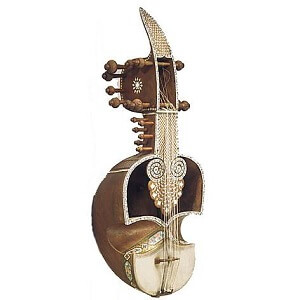Sarinda
 Sarinda, folk fiddle of Afghanistan, Pakistan, and northern India. The deep wood shell has a skin belly up to its narrow waist but is open thereafter on both sides of the fretless fingerboard; the body is commonly shaped like a pouch or bag. The three melodic strings are gut or horsehair. Some versions have sympathetic strings like those of the sarangi.
Sarinda, folk fiddle of Afghanistan, Pakistan, and northern India. The deep wood shell has a skin belly up to its narrow waist but is open thereafter on both sides of the fretless fingerboard; the body is commonly shaped like a pouch or bag. The three melodic strings are gut or horsehair. Some versions have sympathetic strings like those of the sarangi.
The sarinda may derive from the Central Asian qobuz; both are used for shamanic functions and to accompany dance, and both are played by musicians of lower social status.
While the ordinary sarinda has only three strings, examples with four gut strings like this one were sometimes known as sanyogi sarinda and it is recorded that they were usually played by religious ascetics called yogis and fakirs. Besides the four gut strings this instrument has eighteen additional sympathetic wire strings, which are added to create resonance. This instrument has a total of twenty-two tuning pegs.